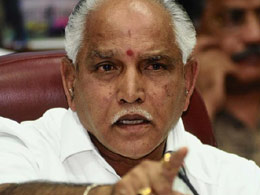
BS Yeddyurappa breaking ranks with BJP and floating his own party, another change of guard, the Cauvery issue, busting of a terror module and an ugly incident of three ministers watching porn clippings in the assembly marked the year 2012 for Karnataka.
The year also saw attacks on girls and boys at a home stay in Mangalore, clash between lawyers and police in the wake of men of legal fraternity attacking journalists and exodus of people from northeastern states following rumours of attack.
The Cauvery water sharing row returned to haunt Karnataka, with Tamil Nadu managing to get court orders for release of water on two occasions and Cauvery basin districts plunged into agitation opposing water release.
The first-ever saffron party government in south India continued to be hit by political turmoil following a banner of revolt launched by its strong man Yeddyurappa, who later launched Karnataka Janata Party with the sole aim of decimating BJP in next year's election.
The other notable events that marked the year was a problem of mounting garbage in the city, which also tarnished the brand name of Bangalore at the international level, resignation drama by ministers and legislators to seek the sacking of D V Sadananda Gowda as chief minister.
There were private complaints pouring against Chief Minister Jagadish Shettar, which the Lokayukta court quashed, Law Minister S Suresh Kumar, former chief minister Sadananda Gowda , BBMP Mayor Venkatesh Murthy and former chief ministers H D Devegowda, S M Krishna and Yeddyurappa accusing them of abusing their power.
The year also witnessed an unprecedented scene of ministers and ruling party legislators boycotting the budget session to press for their demand to sack Gowda and make Shettar as chief minister.
In a continued collision-course between Governor HR Bhardwaj with the government, the former rejected in February the recommendation to appoint retired judge S R Bannurmath as Lokayukta in the wake of him facing a land allotment row.
The image of the BJP government took a beating when two of its ministers, Laxman Savadi and C C Patil, were caught on camera watching porn clippings in the state assembly when the house was debating the hardships faced by drought-hit people.
The footage aired by a regional channel and later by others led to the resignation of three ministers-- J Krishna Palemar, who was accused of providing the clippings, besides Savadi and Patil.
Yeddyurappa got a major relief from the high court in March when it quashed the FIR registered against him in illegal mining case on Lokayukta report and also a chapter in the report that indicted him. This prompted the 70-year-old Lingayat leader to stake claim for re-instating himself as chief minister, a post he was forced to quit in July 2011, but the BJP high command rejected the demand, which ultimately led him to bid adieu to the saffron party and launch KJP.
However, Yeddyurappa suffered a major setback when the Supreme Court ordered a CBI probe in May into illegal mining and mysterious disappearance of iron ore from Belekeri Port in Uttara Kannada district.
The year saw the tragic death of two officials -- Karnataka Administrative Service (KAS) officer Mahantesh, who was murdered by some individuals in Bangalore City and an Assistant Conservator of Forest Madan Naik in Dandeli, who was assaulted by a group of tourists to death for warning them to be beware of crocodiles in the lake, triggering off protests from government servants.
The internal feud that has been simmering in the ruling BJP ever since it came to power in 2008 continued unabated in 2012 and led to sacking of Sadananda Gowda as chief minister by the rebels led by Yeddyurappa.
Yeddyurappa ensured that nine ministers loyal to him quit seeking Gowda's replacement with Shettar on June 29 and they withdrew the resignation on July 2 after BJP high command accepted the demand for change of guard.
Gowda quit as chief minister on July 8 and Shettar, another Lingayat leader, assumed office on July 12. But the rumblings in the government and also the party continued.
People of the state were for a rude shock when the city police announced that they have uncovered a terror module with the arrest of 11 terror suspects who had planned to eliminate prominent politicians and journalists on August 30.
The reputation of the state suffered a major dent when the activists of Hindu Jagaran Vedike stormed a home stay in Mangalore, beat up girls and boys partying there in July. The attack evoked nationwide outrage.





Comments
Add new comment